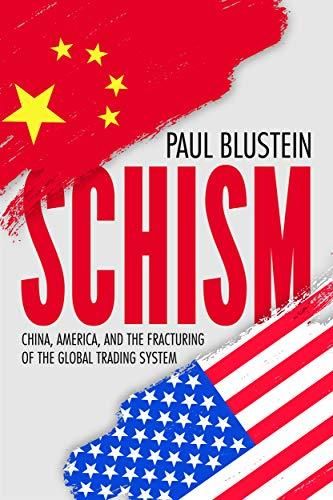International financial and political journalist Paul Blustein breaks down the pros and cons – and consequences – of China joining the WTO.

China and the World Trade Organization
Financial journalist Paul Blustein, senior fellow at the Centre for International Governance Innovation – and author of, among other titles, The Chastening and Off Balance – recounts that American globalization proponents once saw China as a potential ally, edging toward democracy. Those hopes were never realized.
Blustein chalks up the disappointing outcome not to the United States’ missteps, but to China’s culture and politics. The author pulls few punches when describing Chinese mendacity or American incompetence. Discerning readers will find this an illuminating overview of the economic geopolitics of US–Sino relations.
Blustein’s wide-ranging catalog highlights his career-long reporting on financial woes and processes around the world. He has no policy ax to grind and seems free of ideology, except for a strong belief in common sense, which he finds lacking in this saga. Though the title may lead you to think Blustein writes only for finance or policy wonks, he in fact reports for a broad audience seeking to understand the economic currents shaping today’s circumstances.
The Economist, showing typical economy, called Blustein’s work “excellent.” The Financial Times proved more forthcoming and said, “Today, the US is suffering extreme buyer’s regret over China’s accession to the World Trade Organization in 2001. This book provides a deeply researched corrective. No, it would not have been better to have left China dangling outside the WTO, and no, China did not systematically break its commitments. Above all, Blustein argues, the WTO ‘remains the best way of inducing China to play by the rules.’ Amen.”
“China, Inc.”
By 2010, Blustein makes clear, China had abandoned any pretense of transforming itself into a free market economy.
China’s political and economic system is not about to change in fundamental ways, nor is the US political establishment about to alter its conclusion that China is America’s most formidable strategic rival.Paul Blustein
The Chinese Communist Party runs a system known as “state capitalism” or China, Inc. Since the Great Recession, Blustein asserts, neither the United States nor any other country could influence China’s policies. He details how, as a member of the World Trade Organization (WTO), China finds loopholes that disadvantage its rivals.
A Hard Bargain
As a candidate and then president, Donald Trump excoriated the terms of China’s membership in the WTO, but Blustein says US trade negotiators got everything they could. Chinese officials still claim the WTO agreement relegated them to “second-class citizenship.”
Blustein reminds readers that, in 1993, China was a poor country, with per capita income of $380 per year; by 1996, China’s economy was the seventh largest in the world.
Positive Influence
Blustein finds some amusement in the fact that President Bill Clinton thought subjecting Beijing to WTO accession would start China on a path toward more political and economic openness. And, the author adds, many academics and policy makers agreed.
Warnings about the implications of China’s WTO accession were not confined to Westerners fearful about the consequences for the trade body.Paul Blustein
Blustein insists that events proved the skeptics right. For example, he cites Richard Steinberg, a law professor at the University of California, Los Angeles, who wrote that China was different from other WTO members in that it had no tradition of free markets or democratic institutions.
Dollars and Jobs
Blustein offers one estimate that US consumers saved $202 billion from 2000 to 2007 as a result of cheap Chinese imports. But the author recognizes those savings came at the expense of US jobs, especially in manufacturing.
Blustein characterizes Beijing as overjoyed with Trump’s surprise election victory, but Trump insisted on tariffs of 25% on imported Chinese steel and 10% on aluminum. Gary Cohn, director of Trump’s National Economic Council, quit because Trump never consulted him. The tariff move backfired, Blustein reveals, by making US allies less willing to join multinational efforts to contain China.
Trade War
Blustein foreshadows dire consequences stemming from Trump’s 25% tariffs on Chinese imports worth $34 billion, imposed on July 18, 2018; in retaliation, China imposed duties on US products worth $50 billion. The author notes that Chinese purchases of US soybeans plummeted 90%, as the Dow Jones fell 2,000 points in November 2018 and China’s stock market dropped.
Perhaps the United States and China can reach some accommodation that will limit the extent of this bifurcation. But the schismatic forces appear inexorable.Paul Blustein
Trump, Blustein reports, made $200 billion worth of Chinese computers, lamps, furniture and household appliances subject to tariffs. Vice-president Michael Pence called out China’s lack of religious freedom. Blustein cites many sources wondering whether Trump was launching a “new Cold War.”
Unlikely Fun
Among Blustein’s many areas of expertise – superb reporting, remarkably juicy coverage of what seems a dry subject, deadpan savoring of human folly, highly readable prose – his foremost is his ability to make high-stakes international political finance compelling, comprehensible and relevant. He links cause and effect through a maze of behaviors that would seem to obscure any such connection. Blustein never underestimates or underreports the power of idiotic pride or irrational self-confidence. And thus he makes untangling the tangled web of China’s participation in the WTO the last thing you think it might be: fun.
The most illuminating ancillaries for Blustein’s reporting on China are his reportage on everywhere else. Savor his considerable hard-nosed expertise in the politics of international finance in And the Money Kept Rolling In (and Out): Wall Street, the IMF and the Bankrupting of Argentina; Misadventures of the Most Favored Nations; and Laid Low: Inside the Crisis that Overwhelmed Europe and the IMF.










